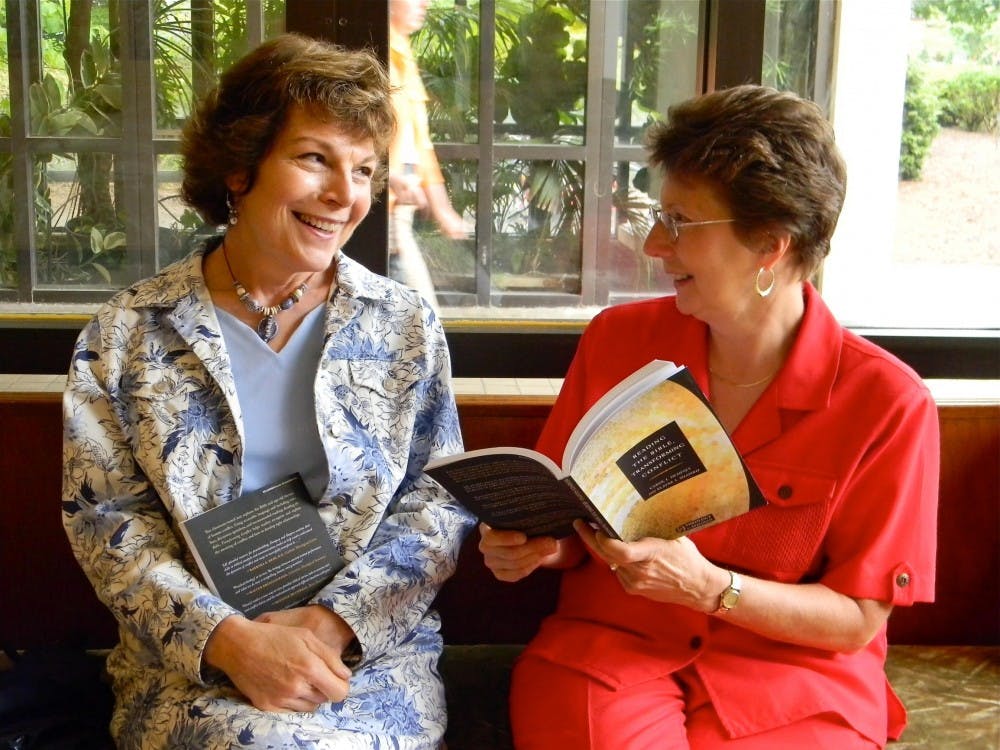Professors Elayne Shapiro and Carol Dempsey team up on book about religion
(Kayla Wong -- The Beacon)
By Rachel McIntosh Staff Writer mcintosh14@up.edu
By blending aspects of their separate faiths, Catholicism and Judaism, and their different fields of study, theology and communication studies, professors Carol Dempsey and Elayne Shapiro co-authored a book that focuses on conflict in the Bible and how the issues of the past can be used to help solve conflict today.
In May, professors Shapiro and Dempsey published the first book in the series "Theology in Dialogue," called "Reading the Bible, Transforming Conflict." The book analyzes specific stories in the Bible from Adam and Eve to the letters of Paul. Shapiro and Dempsey hope to help readers understand and resolve issues that arise over differing perspectives on these well-known stories and to use those stories to resolve real-world conflict.
"The Bible has many illustrations of what not to do and so we learn from them," Shapiro said. "We use stories of tradition to help people transform conflict in their own lives."
Dempsey approached Shapiro with the idea of writing the book after they were asked to teach an interdisciplinary course together called CST 483: Conflict in the Bible. Shapiro is Jewish and a professor of communication studies and Dempsey is a Dominican Sister and a professor of theology, so their long discussions that over the book's content led to a diverse analysis that reflects both faith traditions.
"Both of us have two different styles of writing, of teaching, of collaborating, and so it was a wonderful experience to bring the richness of our diversity into a common project," Dempsey said. "Our own professional and personal lives have been deepened, and we've become not only colleagues but friends – a living example of the richness of the Jewish-Christian Dialogue."
Their emphasis when writing this book was "Tikkun Olam," which is the Hebrew term to "repair the world." Finding a way to move toward right-relationships with people and to show grace to others even in hard times is a main focus of the book. Dempsey and Shapiro work through issues like religion, race and cultural heritage to demonstrate how everyone has a common goal of peace while still displaying and embracing diversity.
The duo examined Biblical narratives as if they were case studies analyzing how issues were addressed then, and how they should be addressed now.
"We look at the Biblical stories as stories that represent ‘the stuff of life,' with its difficulties and conflicts," Dempsey said. "We try to present new models and paradigms that deal with and transform conflict then and now."
Through their collaborations and lengthy discussions, Shapiro and Dempsey broke down barriers in their own understanding of how to form right-relationships with people and God.
"What I learned was how to hear the stories from a living Jewish perspective and the rich heritage that Elayne brought to the conversation," Dempsey said. "We had to work through the assumptions of each other's faith traditions."
While Dempsey and Shapiro were able to experience the Bible through different perspectives, they also came to better understand how grace plays an important role in the world's search for peace.
"Grace offers the option for us to become people of compassion — to delight in each other's perspectives," Shapiro said.
From a Jewish perspective, the concept of grace means "favor," as God would look on the Israelites with "favor." From a Christian perspective, grace takes on a new meaning: God's forgiveness of His peoples' sins. Dempsey and Shapiro address the concept from both perspectives.
The authors are urging readers to be open to different perspectives on Biblical narratives and learn from the conflict of the past in order to prevent it from happening again.
"There are many variables that contribute to conflict and so there are more options for what to do about it," Shapiro said. "But the thing that would make me most happy would be for people to read, engage and care."









